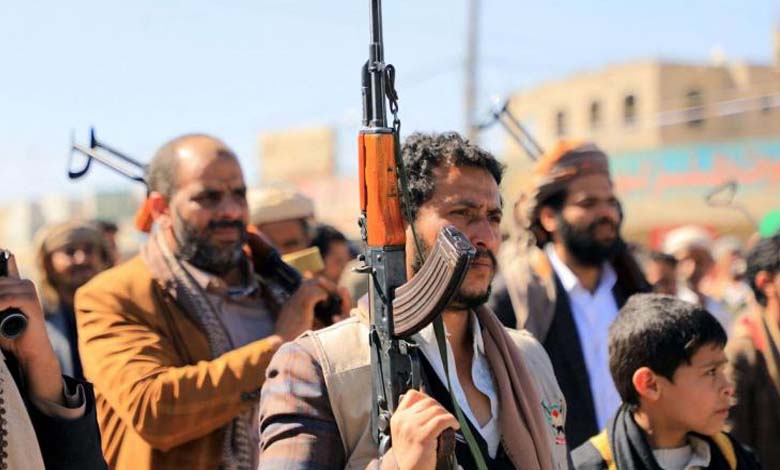Washington Warns of Tehran’s Attempts to “Hide Behind the Houthis”
The Yemeni government attributes the failure to resolve the crisis to the United Nations' and the international community's approach to dealing with the Houthis' behavior

The U.S. Deputy Ambassador to the United Nations, Robert Wood, deemed the transfer of weapons from Iran to the Houthis in Yemen as “unprecedented” and called on Tehran to halt this action, which allows them to carry out “reckless attacks” on ships in the Red Sea and other locations.
During a speech at the Security Council, Wood stated that if this organization wants to end the civil war in Yemen, it must unanimously warn Iran that it can no longer “hide behind the Houthis” and must immediately cease its destabilizing actions. He added, “There is plenty of evidence showing that Iran is supplying the Houthis with advanced weapons, including ballistic missiles and cruise missiles, in violation of UN sanctions. Therefore, the UN Security Council must stop the ongoing arms embargo violations and take further action to address the sanctions violators.”
According to Western reports, the weapons supplied by Iran to the Houthis enhance their ability to attack commercial ships and disrupt international trade, despite airstrikes by the United States and the United Kingdom against the Houthis.
The Wall Street Journal quoted officials and analysts as saying that the Houthis, “once ridiculed and underestimated as scattered militias operating in remote desert areas of Yemen, have recently become among Iran’s most capable proxies in terms of military capabilities, due to the flow of weapons from Tehran and their prowess in local battles.”
Among the sophisticated equipment provided by Iran to the Houthis are unmanned aerial vehicle jamming devices and parts of long-range missiles and shells, according to the American newspaper.
The Houthis claim that their attacks on ships in the Red Sea and the Gulf of Aden are aimed at pressuring Israel to end its war on Gaza, which has resulted in the deaths of more than 35,000 Palestinians.
The U.S. Maritime Administration reported last month that the Houthis had launched more than 50 attacks on ships, seized one vessel, and sunk another since November of last year. The frequency of Houthi attacks has decreased in recent weeks as the United States led an airstrike campaign against them. Shipping traffic through the Red Sea and the Gulf of Aden has declined due to these threats.
However, the UN Special Envoy to Yemen, Hans Grundberg, warned the Security Council that “hostile acts continue despite the reduction in the frequency of attacks on commercial and military ships in the Red Sea, the Gulf of Aden, and the Indian Ocean.” He noted the Houthis‘ announcement that they would expand the scope of attacks, describing it as “a troubling provocation amid an already volatile situation.”
In his briefing to the Security Council, Grundberg expressed concern about the threats of “returning the country to the flames of war” and called on all parties to exercise maximum restraint. He said, “I am concerned about the parties’ threats to return to war, including the statements and actions of the Houthis regarding Marib. More violence will not solve the conflict but will lead to missing the opportunity for a political settlement.”
Grundberg added that in December of last year, the Houthis and the government took a “bold step towards a peaceful solution” by agreeing to a series of commitments to halt nationwide ceasefire, ensure urgent humanitarian aid access to the population, and initiate a political process to end the conflict.
However, the UN Humanitarian Coordinator reported “alarmingly high levels” of acute food deprivation across the country, expected to worsen during the upcoming dry season for crops, starting in June. He also expressed grave concern about “the rapidly escalating cholera epidemic in Yemen.”
He pointed to reports of 40,000 suspected cholera cases and more than 160 deaths – a sharp increase compared to last month, with most cases in areas controlled by the Houthis. Grundberg said, “Hundreds of new cases are being reported daily.”
Meanwhile, the Yemeni government called for a reconsideration of the approach to dealing with the Houthi militias to revive the peace process in the country. It attributed the failure to resolve the Yemeni crisis to the United Nations’ and the international community’s approach to dealing with the Houthis‘ behavior, the lack of effective implementation of relevant Security Council resolutions, and all agreements, commitments, and understandings within the framework of the peace process, including the Hudaydah and Stockholm agreements.
The Permanent Representative of Yemen to the United Nations, Abdullah Al-Saadi, reaffirmed his government’s commitment to the peace process and its continued support for regional and international efforts leading to peace.












